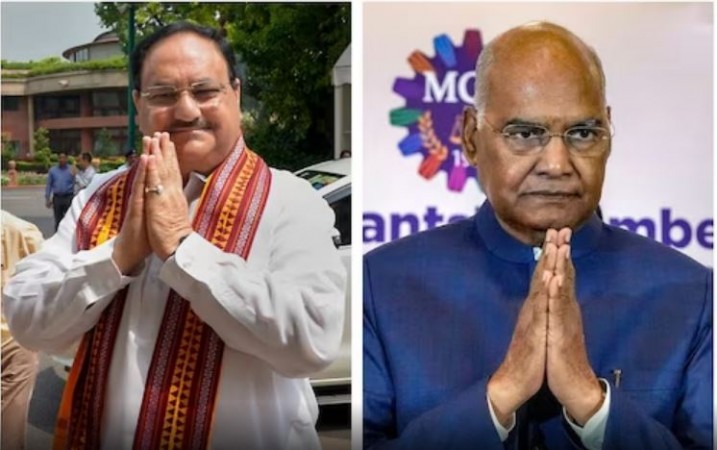
New Delhi: In its latest Updates, JP Nadda, the national president of the Bharatiya Janata Party (BJP), convened with former President Ram Nath Kovind at the latter's New Delhi residence on Friday. The meeting carries substantial weight as the Central Government has established a committee led by the former President to delve into the feasibility of implementing the 'One Nation, One Election' concept.
If this proposal becomes a reality, it would entail simultaneous elections for the Lok Sabha (the lower house of India's Parliament) and state legislative assemblies across the nation. This monumental political shift would witness voters participating in both elections concurrently. The government has scheduled a Special Session of Parliament from September 18 to 22, during which it is anticipated that legislation related to this proposal may be introduced.
Simultaneously, Pralhad Joshi, the Union Parliamentary Affairs Minister, expressed his thoughts on Friday regarding the forthcoming committee report's parliamentary discussion. He questioned why the opposition appeared apprehensive about it.
Joshi remarked, "There will indeed be a thorough discussion on 'One Nation, One Election' in Parliament. The opposition's apprehensions warrant scrutiny. Democracy continually evolves, and India, as the cradle of democracy, stands at the forefront of this evolution. In this evolving landscape, every novel proposal designed to benefit the nation must be subject to deliberation. Presently, a committee has been established to provide recommendations, following which an extensive debate will transpire on the subject. It's worth noting that simultaneous elections for the Lok Sabha and State Assemblies were the norm until 1967. Given the frequency of elections in recent years and the substantial financial outlay they entail, a comprehensive discussion is both timely and imperative."
Previously, a parliamentary standing committee, the Law Commission, and Niti Ayog had already examined the 'One Nation, One Election' proposal, each delivering their reports on the matter.
The potential realization of 'One Nation, One Election' implies the synchronization of elections for the Lok Sabha and state legislative assemblies, marking a significant shift in India's electoral landscape. Prior to 1967, such synchronicity existed. However, unforeseen developments, including the premature dissolution of certain state legislative assemblies in 1968 and 1969, followed by the dissolution of the Lok Sabha in 1970, disrupted this synchronicity, necessitating changes to electoral schedules for states and the nation.
Nevertheless, it's crucial to note that the opposition has raised objections to the 'One Nation, One Election' concept. Kamal Nath, former Chief Minister of Madhya Pradesh, emphasized that its implementation would require not only a constitutional amendment but also the approval of individual states. He elaborated, "In states governed by the BJP, such as Haryana and Maharashtra, they can decide and propose the dissolution of their respective legislative assemblies within their cabinets. However, curtailing the duration of a state assembly isn't as straightforward as it might seem."
Committee Led by Ex-President Ram Nath Kovind to Study 'One Nation, One Election'
Is India Ready for 'One Nation, One Election'? An Early Lok Sabha Poll Looms?